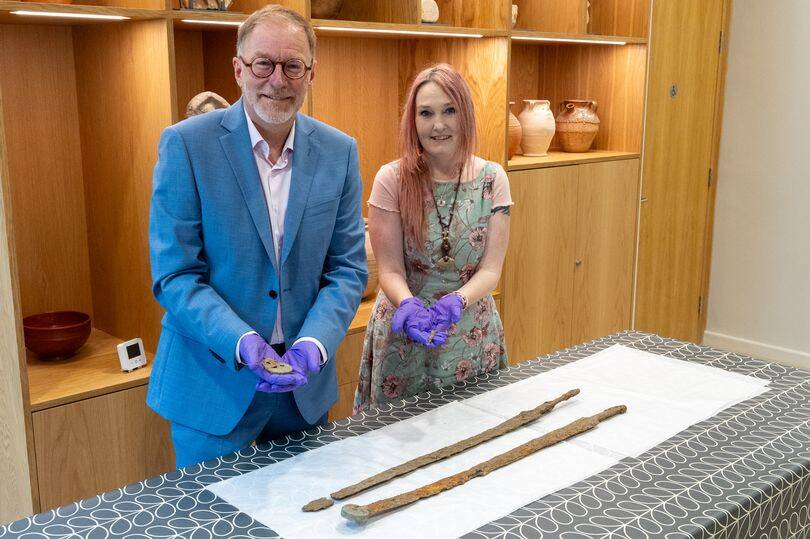
Hội đồng quận CotswoldThành viên Hội đồng Quận Cotswold Paul Hodgkinson và Giám đốc Bảo tàng Corinium Emma Stuart tạo dáng bên những thanh kiếm spatha La Mã mới được phát hiện.
Researchers recently announced the discovery of two rare Roman cavalry swords that were originally found during a metal detectorist rally in March 2023. Remarkably, each sword was found still in its wooden scabbard and fitments.
The incredible find was made by metal detectorist Glenn Manning in the northern Cotswolds in England. Alongside the swords, researchers also found a broken copper alloy bowl.
According to Arkeonews, the swords have since been appraised by Leicester University professor Simon James, who said the swords are commonly known as “spatha,” which date back to the middle-imperial Roman period.
James said the swords were likely created sometime around the 160s C.E. and used well into the third century.
“In terms of parallels, I can’t think of finds of more than one sword being deposited in any similar circumstance from Roman Britain,” James said. “The closest that springs to mind was a pair of similar swords found in Canterbury — with their owners, face down in a pit within the city walls, clearly a clandestine burial, almost certainly a double murder.”
Based on the length of the blades, James said, the swords were most likely intended to be used on horseback. Notably, it was not uncommon for everyday citizens to carry such weaponry, given the breadth of the Roman Empire and the various hordes of bandits who roamed it.
Despite their relative commonness, though, only four such swords have been found, according to a video shared by the Cotswold District Council.
“Some people have often asked jokingly, ‘What have the Romans ever done for us?’” said council member Paul Hodgkinson. “Well, I can tell you, what they’ve done for us is they’ve given us two amazing new discoveries.”
Museum Director Emma Stuart said the two swords “are testimony to the presence of Roman military in the north of the Cotswold District.”
“It’s an incredibly important find,” she said, “and one that should excite everybody across Britain… The question is, and the mystery is, why were those swords buried in the north of the Cotswolds? What were they doing there? And how are we going to find out any more about the swords after they’ve been lifted out of the ground?”
The current plan is to display the swords at the Corinium Museum in Cirencester. As for future plans, Stuart expressed hope that the find will spark a more thorough investigation of the discovery site, which could potentially reveal even more information about the Roman presence in the Cotwalds nearly 2,000 years ago.
Historic England is also assisting the museum by arranging for the swords to undergo further X-ray analysis.
This is the second discovery of ancient Roman spatha swords this month. Earlier this month, archaeologists working in a cave in the Judean Desert uncovered four 1,900-year-old spatha swords, which they believe were taken as booty by Judean rebels during the Bar Kokhba revolt.
Three of the swords were still protected in their wooden and leather sheaths, each measuring between 24 and 26 inches. At the time of their discovery, Israel Antiquities Authority director Etian Klein said it was “an extremely rare find, the likes of which have never been found in Israel.”
It seems that no matter where in the world these ancient Roman blades are discovered, it is an incredibly rare and exciting event.